Publications
Books
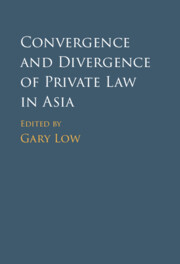
Convergence and Divergence of Private Law in Asia
Publisher: Cambridge University Press
There has been an increasing need for greater integration of many Asian economies, either within the confines of ASEAN or on a more geo-economically strategic scale including major Asian jurisdictions like China, Japan, and Korea. A number of key personalities within the regional legal fraternity have advanced views that such integration ought to occur through the harmonization of legal rules, arguing that in doing so, uncertainty and other transaction costs would be reduced and commercial confidence within the region concomitantly increased. This edited volume brings together eminent and promising scholars and practitioners to investigate what convergence and divergence means in their respective fields and for Asia. Interwoven in the details of each tale of convergence is whether and how convergence ought to take place, and in so choosing, what are the attendant consequences for that choice.
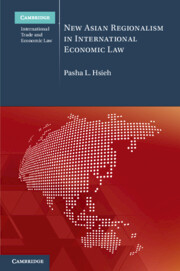
New Asian Regionalism in International Economic Law
Publisher: Cambridge University Press
This book provides the first systematic analysis of new Asian regionalism as a paradigm shift in international economic law. It argues that new Asian regionalism has emerged amid the Third Regionalism and contributed to the New Regional Economic Order, which reinvigorates the role of developing countries in shaping international trade norms. To substantiate the claims, the book introduces theoretical debates and evaluates major regional economic initiatives and institutions, including the ASEAN+6 framework, APEC, the CPTPP and the RCEP. It also sheds light on legal issues involving the US-China trade war and the COVID-19 pandemic, as well as trade policies of Asian powers, the European Union and the United States. Hence, the legal analysis and case studies offer a fresh perspective of Asian integration and bridge the gap between academia and practice.
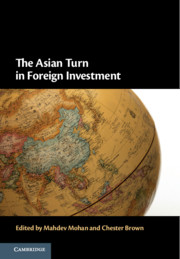
The Asian Turn in Foreign Investment
Publisher: Cambridge University Press
This book provides the first systematic analysis of new Asian regionalism as a paradigm shift in international economic law. It argues that new Asian regionalism has emerged amid the Third Regionalism and contributed to the New Regional Economic Order, which reinvigorates the role of developing countries in shaping international trade norms. To substantiate the claims, the book introduces theoretical debates and evaluates major regional economic initiatives and institutions, including the ASEAN+6 framework, APEC, the CPTPP and the RCEP. It also sheds light on legal issues involving the US-China trade war and the COVID-19 pandemic, as well as trade policies of Asian powers, the European Union and the United States. Hence, the legal analysis and case studies offer a fresh perspective of Asian integration and bridge the gap between academia and practice.
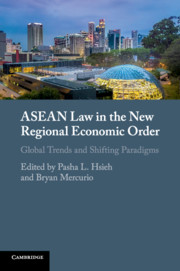
ASEAN Law in the New Regional Economic Order: Global Trends and Shifting Paradigms
Publisher: Cambridge University Press
The fast-growing last decade of strong economic growth of the Association of Southeast Asian Nations (ASEAN) has played a critical role in Asia-Pacific regionalism and global trade. This book explores the concept of ASEAN law under the normative framework of the new regional economic order. It examines the roadmap of the new ASEAN Economic Community Blueprint 2025 by evaluating the impact of ASEAN trade agreements on domestic legislation on professional services, financial integration, investment disputes and digital trade. More importantly, it sheds light on the legal implications of ASEAN's agreements with China and India and the potential developments of mega-regional trade agreements such as the CPTPP and the RCEP. Hence, the legal analysis and case studies in the book offer a fresh view of Asia-Pacific integration and bridge the gap between academia and practice.
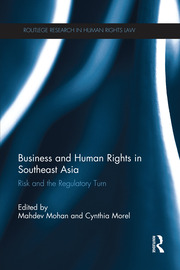
Business and Human Rights in Southeast Asia: Risk and the Regulatory Turn
Publisher: Routledge
Business and human rights has emerged as a distinct field within the corporate governance movement. The endorsement by the UN Human Rights Council of a new set of Guiding Principles for Business and Human Rights in 2011 reinforces the State’s duty to protect against human rights abuses by third parties, including business; the corporate responsibility to respect human rights; and greater access by victims to effective remedy, both judicial and non-judicial.
This book draws on the UN Guiding Principles and recent national plans of action, to provide an overview of relevant developments within the ASEAN region. Bridging theory and practice, the book sheds light on how stakeholders currently approach business and human rights, and explores how the role of ASEAN States, and that of the institution itself, may be strengthened. In doing so, it identifies critical challenges and opportunities that lie ahead for the region in relation to business and human rights. This book will be of excellent use and interest to scholars, practitioners and students of human rights, business and company law, international law and corporate governance.
Journal Issues
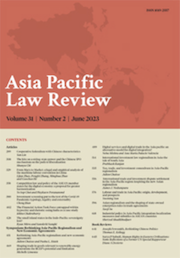
Asia Pacific Law Review (June 2023)
Publisher: Routledge
Business and human rights has emerged as a distinct field within the corporate governance movement. The endorsement by the UN Human Rights Council of a new set of Guiding Principles for Business and Human Rights in 2011 reinforces the State’s duty to protect against human rights abuses by third parties, including business; the corporate responsibility to respect human rights; and greater access by victims to effective remedy, both judicial and non-judicial.
This book draws on the UN Guiding Principles and recent national plans of action, to provide an overview of relevant developments within the ASEAN region. Bridging theory and practice, the book sheds light on how stakeholders currently approach business and human rights, and explores how the role of ASEAN States, and that of the institution itself, may be strengthened. In doing so, it identifies critical challenges and opportunities that lie ahead for the region in relation to business and human rights. This book will be of excellent use and interest to scholars, practitioners and students of human rights, business and company law, international law and corporate governance.
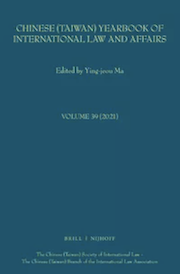
Chinese (Taiwan) Yearbook of International Law and Affairs (December 2022)
Publisher: Brill Nijhoff
Volume 39 of the Chinese (Taiwan) Yearbook of International Law and Affairs features peer-reviewed articles selected from revised papers presented at the International Law Association (ILA)-American Society of International Law (ASIL) Asia-Pacific Research Forum on 5-6 August 2021. Due to the pandemic, the Research Forum was organised online, with the Centre for Commercial Law in Asia of the SMU Yong Pung How School of Law.
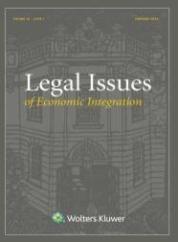
Legal Issues of Economic Integration (March 2022 special issue)
Publisher: Wolters Kluwer
The agreements and relations between the EU and ASEAN countries enrich the theoretical concept of interregionalism and advance exogenous influences on new Asian regionalism. Questions have arisen as to the legal designs and business implications of new EU trade and investment agreements with Singapore and Vietnam, as well as the prospective ASEAN-EU FTA. Against this backdrop, Pasha L. Hsieh and Dorcas Quek Anderson of the Singapore Management University Yong Pung How School of Law convened a conference on the roadmap to the ASEAN-EU FTA in December 2020. With the sponsorship of the SMU Centre for Commercial Law in Asia, the conference brought together leading academics and government officials from Asia-Pacific countries and the European Commission. Participants' contributions to the conference led to this special issue on "Shaping Interregionalism: The Roadmap to the ASEAN-EU FTA in the Post-Pandemic Era". It provides the most timely and analytical account of EU FTAs with Singapore and Vietnam in light of contemporary trade strategies and domestic legal reforms.
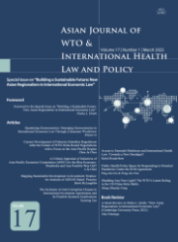
Asian Journal of WTO & International Health Law and Policy (March 2022 special issue)
Publishers: Asian Center for WTO & International Health Law and Policy (College of Law, National Taiwan University) and National Taiwan University Press
This special issue of the Asian Journal of WTO & International Health Law and Policy contains selected papers from the 7th Asian International Economic Law Network Conference, organised by the Centre for Commercial Law in Asia (Singapore Management University) and the Asian Center for WTO & International Health Law and Policy (National Taiwan University College of Law). The theme of the special issue is "Building a Sustainable Future: New Asian Regionalism in International Economic Law". The papers cover wide-ranging topics and highlight legal challenges to conflicts between Great Powers, fishing subsidies, sustainable development provisions of investment pacts, the trade-health nexus in the context of the COVID-19 pandemic, and renewable energy disputes under the World Trade Organization.